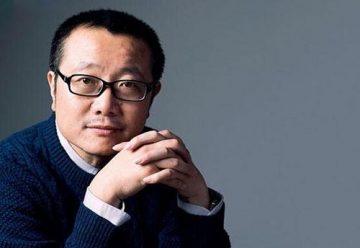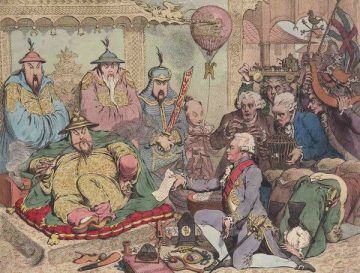by Robert Fay

In The Three Body Problem by Cixin Liu, China has made contact with a technologically-advanced alien civilization called Trisolaris. The aliens plan to invade earth and are cultivating a cadre of earthling collaborators, most of whom are Chinese nationals. The Trisolarians accomplished this, not by using sex or blackmail to recruit agents a la the FSB or CIA, but by creating a seductive computer game designed to both introduce the nuances of Trisolarian civilization, as well as to weed out unworthy recruits. As recruits progress in the game, they proceed through evolutionary epochs of Trisolarian history, which curiously enough, includes historical personages from earth. In one early stage of Trisolarian development, the great Chinese Emperor Qin Shin Huang supervises the successful creation of a massive human computer, involving the recording of endless semaphore signals conducted by tens of thousands of Trisolarian soldiers raising up and down flags.
The emperor is filled with pride: “Each individual’s behavior is so simple, yet together, they can produce such a complex, great whole!” he says. “Europeans criticize me for my tyrannical rule, claiming that I suppress creativity. But in reality, a large number of men yoked by severe discipline can also produce great wisdom when bound together as one.”
It’s not impossible to imagine Chinese President Xi Jinping saying this in a moment of candor. If China continues to skillfully counterbalance all of its many contradictions, why wouldn’t Xi stand before the U.N. General Assembly and proclaim the singular superiority of his one-party, authoritarian model of capitalism? For the Chinese today are no longer content with praise, they believe the world should begin studying and imitating China.
This wouldn’t be unprecedented. Many aspects of traditional Korean and Japanese culture were born from scholars, priests, artists and others traveling to China to study its cultural riches. There was also the old imperial Chinese tributary system, which “cemented China’s status as the Middle Kingdom. For centuries, other nations bowed in recognition of China’s imperial might, bestowing gifts on the emperor and accepting vassal status to secure trade and peace,” according to Peter S. Goodman and Jane Perlez in The New York Times.
*
President Obama, the man who advocated an “Asian pivot” after years of U.S. wars in the Middle East, said he is a big fan of The Three Body Problem. President Trump, we can safely assume, has not read Liu’s novel or any other books recently, but he is undeniably interested in Asia. His trade war, if anything, has forced both nations to publicly acknowledge a high-stakes geo-political game of winner-takes-all is now under way.
China is intent on owning future technologies, specifically in the areas of Artificial Intelligence and electric automobiles, and this drive is fueled by past humiliations, when more technologically-advanced colonial powers ravaged China. The defeats during the Opium Wars (Britain received Hong Kong as a result) and the brutal occupation of Manchuria and northeast China by the Japanese Army during World War II, remain raw and painful.
So now it is China’s turn to project external power and right some historical wrongs. “China is the land that invented the compass, gunpowder, paper and printing, amassing stupendous wealth while Europe was still backward,” writes Goodman and Perlez. “Then came centuries of humiliation — Britain’s profiting from forcing opium on the populace, Japanese brutality, demeaning lectures about human rights from hypocritical Americans. Now, China is intent on securing its own fate.”

Many foreign policy actors in the U.S., including former U.S. Secretary of Defense James Mattis, fear the U.S. and China may be falling into the so-called Thucydides Trap, which is the theory that when a dominant power’s position is threatened by a rising power, war is always inevitable.
*
The Three Body Problem was published in 2006 in China and appeared in its English translation in 2014. It is the first book of a trilogy and the first Asian novel, as well as the first translated novel, to win the Hugo Award, the highest literary honor in science fiction. Many readers and critics have understood the novel as an allegory of the struggle between the west and China. Liu appeared to sanction this interpretation for a time, but has since backed off, saying that he is a computer engineer and a writer of fiction, nothing more.
One of the critical themes in The Three Body Problem is how widespread environmental destruction is a sign that mankind has reached a dead-end in its social and moral development.
Ye Wenjei is an astrophysicist who is exiled to rural China during the madness of the 1960s Cultural Revolution. She witnesses state-sponsored destruction of the forests and in a moment of despair is given a clandestine copy of Silent Spring (1962), the seminal environmental book by Rachel Carson on the consequence of pesticides. Ye is amazed that a book with such a frank indictment of an institutionalized practice can exist.
Fast forward to the “near future,” and we meet a group of environmentalists who belong to a movement known as “Pastoral China.” The group advocates a policy of de-urbanization: dismantling cities, and returning to an older Chinese model of villages and towns. They are essentially neo-Luddites and their founder believes: “The explosive development of technology was analogous to the growth of cancer cells, and the results would be identical: the exhaustion of all sources of nourishment, the destruction of organs, and the final death of the host body.”
War and political chaos has always been features of human society, but climate change and environmental destruction are true existential threats, and they call for collective effort and sacrifice.
Yet what if the western, liberal order—with its focus on materialism, consumption, individual rights and the pursuit of happiness—is an obstacle to addressing climate change? What if the individual must now, more than ever, begin to wave its rights in favor of collective survival? What if the Chinese model is the one best suited to the climatic, demographic and resource challenges of the 21st Century?
Yet as the protests in Hong Kong demonstrate, even people who possess deep cultural and linguistic ties with China, have deep reservations about living under the Chinese political system.
*
In China the individual has historically been a footnote in the larger, collective story of the nation. In a New Yorker profile of Liu, Jiayang Fan recounts how Liu visited his grandparents in Henan during the great flood of 1975; fifty dams collapsed and a quarter of a million people died. One tries to imagine this scale of human death in the U.S. It makes our memorializing of the 2,600 people who died in the World Trade Center seem almost self-indulgent. “No one is more aware than Liu of the connection between the ambitions of sci-fi and the tendency of Chinese history to eclipse the individual,” writes Fan.
Yet the nations of the world might consider eclipsing the needs of the individual if we wish to address climate change in a collective manner. And—who knows?—perhaps China, with its history of doing so, might be in the best position to lead this project.
History provides a recent and instructive case study of U.S./China strategic thinking.
The last time that U.S. and Chinese military forces went head-to-head was in 1950. It was the infamous Battle of the Chosin Reservoir in North Korea, when the People’s Liberation Army (PLA) crossed the Yalu River and attacked the 1st. U.S. Marine Division and some smaller U.S. Army units during an epic winter freeze. The PLA had no air or artillery support, rudimentary small arms and soldiers equipped with tennis shoes. This was a true peasant army, but it was not lacking in people volume or raw courage (some would say insanity).
The PLA repeatedly charged the U.S. lines in full frontal assaults. And while hundreds of Chinese were sacrificed in seconds, the U.S. Marines went to ridiculous lengths to retrieve wounded and dead individual Marines on the battlefield. The Chinese, just like the Japanese in the previous war, watched in astonishment as Marines rushed out from cover to retrieve a man who was either dead or soon-to-be-dead. It might cost the lives of two or three Marines, just to retrieve one mortally-wounded man.

The Chinese had an estimated 50,000 casualties, with around 30,000 of this total due to the cold alone (total number of deaths is not known). The U.S. death toll was just over 1,000, with total casualties around 18,000; an astounding number of U.S. casualties (historically speaking) for just over two weeks of fighting.
To this day the U.S. Marine Corps celebrates the battle as a brilliantly executed “fighting withdrawal,” because fighting a numerically-superior enemy while in retreat is one of the most complex maneuvers on the battlefield. And the U.S. Marines did it, preserving the 1st Marine Division and getting the bulk of their men out and onto waiting ships. It was impressive. But there is no disputing that the PLA succeeded in their objective: expelling the U.S. Marines from the northern portion of the Korean peninsula and preventing a “capitalist” power from creating a proxy regime on its borders.
The strengths of both nations were on undoubtedly on display. The U.S. Marines are a small, flexible fighting organization that believes in pushing command authority far down the chain-of-command. Compared to other military outfits, 19- and 20-year-old Marine NCOs, corporals and lance corporals, are given a tremendous amount of latitude to make real-time battlefield decisions. This culture produces great individual leaders, such as Gen. Lewis “Chesty” Puller and Gen. James Mattis, and makes the Marine Corp dynamic and flexible.
On this Chinese side a massive gap in technology and war materials (circa 1950), meant stealth and raw sacrifice were the only options. The Chinese moved two whole Army Groups into Korea—undetected by U.S. air reconnaissance—by hiding in the snowy terrain during the day and moving at night. And when the PLA attacked the U.S. lines, Chinese sappers would throw themselves onto the barbed wire, so their comrades could step on them and move forward. The kind of sacrifice, giving up your life for another, is what Jesus in the Gospels calls the highest form of love.
*
Sacrifice used to be part-and-parcel of the western self-identity. Jesus on the cross at Calvary was the central spiritual truth of Christendom. The west, of course, left much of this behind during the Enlightenment. The French Revolution further asserted the rights of individuals. If anything, the consumption of consumer goods is the true religion of the west now, and it demands we all act immediately on our impulses, cravings and desires.
This hasn’t worked out well for the planet.
And now we have China, almost inexplicably, managing to marry consumption-based capitalism with a classic authoritarian political system. It would seem to be the worst of both worlds.
For this and many other reasons, it’s reasonable for the U.S. foreign policy establishment to want to curtail the global ambitions of an imperial-minded China. But in doing so, we may sink key opportunities to cooperatively address common problems, such as climate change. And we may also risk falling into the dreaded Thucydides Trap.
I’m reminded of the famous remark by Gen. Puller when it became clear the Marines at Chosin were entirely cut off and surrounded by Chinese forces. “Great,” he proclaimed to his men. “Now we can shoot at those bastards in every direction.”
One wonders what the U.S. response will be in ten, twenty years when China is even more powerful and perhaps more antagonistic, and the warming of the planet can no longer be restrained.
We’ll likely need far more than bravado to save us then.
Robert Fay’s essays, reviews and stories have appeared in The Atlantic, The Millions, The Los Angeles Review of Books and The Chicago Quarterly Review, among others. He is co-creator of the Feeling Bookish Podcast. Follow him on Twitter @RobertFay1.
